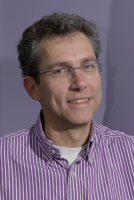Erik Dietzenbacher appointed Professor of Interindustry Economics

Dr Erik Dietzenbacher of the department of International Economics and Business has been appointed to the chair of Interindustry Economics. The starting point within this field is that no single branch within today’s open economies is autonomous. Dietzenbacher has discovered an important cause of the water shortage in Southern Spain with his analyses.
‘In a production process, there’s always a question of mutual dependence’, says the professor, ‘and in addition there are relationships with parties who stand outside the production process, for example consumers, investors and government bodies as well as the suppliers of labour and capital, who supply all kinds of raw materials and fuels and absorb waste products.’ Input-output analyses are the basis of a lot of research in this field. Dietzenbacher: ‘Particularly in the field of energy and environmental economics there are numerous research possibilities with enormous databases with data about, for example, the CO2 emissions per country, branch or region.’
Developing countries
The professor recently demonstrated in an input-output study the erroneousness of the theory that rich countries are leaving the most polluting production processes to developing countries so that they themselves can satisfy the Kyoto norms, and then import those products. ‘India shows that the opposite is the case’, according to Dietzenbacher, ‘We have calculated that this country actually produces ‘clean’ goods and exports them to rich countries. This contradicts the traditional “pollution haven” theory’.
Cause of water shortage
In a different study, Dietzenbacher discovered that the cause of the water shortage in the dry Spanish province of Andalusia is the export of water. ‘It’s actually “virtual water”’, he says, “During the production and transport of, for example, citrus fruits abroad, enormous amounts of water are used. One euro’s worth of citrus fruits takes 3,000 litres of water. We calculated that at least 20 percent of the water can be saved by stopping the export of agricultural products. The costs are not that much, either: it would “only” result in a decrease of 3 percent in employment and income levels.’ Dietzenbacher’s results have in the meantime been communicated to the relevant government bodies.
Teaching
In addition to research, teaching is of course one of the professsor’s important duties. Dietzenbacher currently teaches courses in International Economics and Business and the Research Master degree programme. ‘The most important thing I want to teach students is a passion for the subject and a critical attitude towards every letter that they read and every word they hear from a lecturer.’
Curriculum Vitae
Erik Dietzenbacher (1958, Brunssum) studied Econometrics and gained his PhD in Economics in 1991. He is a member of the department of International Economics and Business. In addition to his chair in Groningen, he is Affiliate Research Professor at the Regional Economics Applications Laboratory of the University of Illinois in Urbana-Champaign. He is also editor-in-chief of Economic Systems Research (the journal of the International Input-Output Association), co-editor of Estudios de Economía Aplicada, and associate editor of the Journal of Regional Science. He is director of the International Economics, Business and Management research institute, a fellow of the SOM research School and of the Netherlands Network of Economics (NAKE). He has edited six books and published more than 50 articles in international scientific journals.
Note for the press
For further information: Prof. H.W.A. Dietzenbacher, tel. (050)363 38 13, e-mail: h.w.a.dietzenbacher rug.nl , website: www.rug.nl/economie/faculteit/medewerkers/dietzenbacherhwa
More news
-
09 December 2025
Are robots the solution?
-
10 November 2025
Decentralization of youth care
